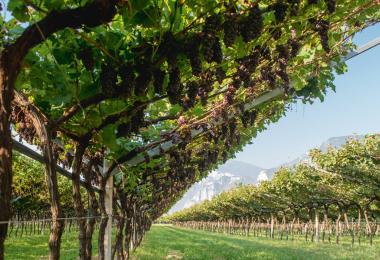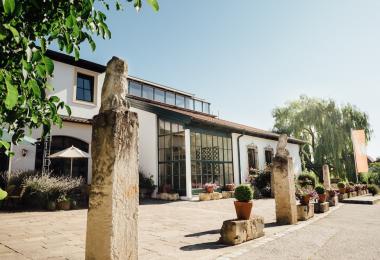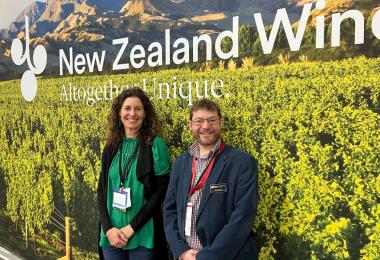Maremma, once the heart of the Etruscan empire, was once considered Italy’s wild frontier. After the fall of the Roman empire, it was abandoned to bandits and mosquitoes, and people gave it a wide birth, even after its marshland was drained in the 1930s.
In the 1990s, however, winemaking pioneers moved in – and today, Maremma is one of Italy’s most promising regions.
A region emerges
Extending from the southern coast of Livorno, through the Province of Grosseto in southern Tuscany and into Lazio, the Maremma extends over Mediterranean hilly scrubland, ancient maritime pine forests and ample sandy beaches. The vineyards form part of the beauty of this wild, off-the-beaten-track place, which is as different from the rest of Tuscany as its wines are.
Viticulture has contributed to shaping Maremma’s landscape since the time of the Etruscans. Maremma was the heart of ancient Etruria, the Etruscan kingdom that stretched between the rivers Arno and Tiber and reached the apex of its splendor between the 7th and the 4th centuries BC.
Today, while Maremma is home to some of Italy’s most expensive and sought-after wines, such as Ornellaia, Sassicaia and Masseto – all Super Tuscans from Bolgheri – it remains obscure to most wine lovers. Although Bolgheri is in the Maremma geographically, it gained its own DOC in 1983. Despite the fame of these Super Tuscan wines, Francesco Mazzei, President of the Consorzio Maremma Toscana, thinks the area’s driving force will be its white wines, particularly Vermentino.
“I always believed in Maremma’s potential; however, though I am happy with how the territory is panning out, we still have a long way to go,” he said. “My aim is to put Maremma on the global map and once that has been achieved, I want to make Maremma the motherland of Vermentino.”
There are 747 ha of Vermentino planted in the region – less than 10% of the vineyard area – particularly around the coastal areas. It’s the main white grape variety, responsible for the bestselling DOC wine in the market. In 2019, production rose to 1.6m bottles, accounting for 28% of total bottled production.
In terms of total wine production, whites equate to 31% and rosé – made from Sangiovese, Syrah, Ciliegiolo, Alicante, Merlot, and Aleatico grapes – has risen to 4%, gaining increasing attention. Maremma’s historic DOCGs, Morellino di Scansano and Montecucco, both based on Sangiovese, are the driving force behind the region’s red wines, which account for 64% of production.
While Vermentino and Sangiovese are important grapes, no other area in Tuscany can offer such a wide variety of wines. The region also offers indigenous varieties like Ciliegiolo, Canaiolo Nero, Alicante, Sangiovese, Pugnitello, Aleatico, Vermentino, Trebbiano, Ansonica, Malvasia and Grechetto. International varietals such as Cabernet Franc, Merlot, Syrah, Viognier, Sauvignon, Chardonnay and Petit Verdot have also been added into the mix; Cabernet Sauvignon has been around since 1944.
The Maremma extends over 450,000 ha, of which 8,770ha is devoted to vines. To put the vineyard surface into perspective, DOC Maremma Toscana is the third largest vineyard area of the Tuscan DOCs, behind that of Chianti and Chianti Classico. Its grapes create distinctive wines.
“Maremma borders with Montalcino, but it yields an entirely different wine in character. There is more warmth and more fruit in the wines,” says Stefano Marzotto, one of the four brothers who own Santa Margherita Wine Group. It bought the Sassoregale estate in 2000 with the intention of adding a fruity, easy-drinking Sangiovese to their production line. According to Marzotto, Maremma’s Sangiovese is more consumer friendly in comparison to the more austere, complex Sangiovese from the classic areas of Tuscany.
The wine pioneers come
The Santa Margherita Group were not the only ones to tap into the potential of Maremma. Just to mention a few other notable names who invested in the 1990s: Gruppo Zonin with their Montemassi estate; Stianti Mascheroni’s Castelprile estate (owners of Castello di Volpaia in Chianti Classico); Checchi’s Val delle Rose estate; Paolo Panerai and Eric de Rothschild’s joint venture with Rocca di Frassinello and Mazzei’s Belguardo estate. Some of the wineries are architecturally significant, such as Rocca di Frassinello’s winery. Designed by architect Renzo Piano, it has a barrel room 40 metres square – and it encompasses part of the Necropolis of San Germano, an important Etruscan site from the 6th and 7th centuries BC:
The winery’s promotions are nothing if not bold. The back label of Rocca di Frassinello’s high-end Baffonero reads: “Born to be the challenger of Masseto, Baffonero is now one of the world’s best Merlot”. It’s a direct challenge to the neighbouring appellation Bolgheri, with its iconic, world-renowned single-vineyard Merlot, which sells in the US for $800 a bottle (versus $150 a bottle for Baffonero).
Other producers also have faith in Maremma’s Merlot. “We selected the clones of Merlot that would best fit the soil here and we do a very high selection in the vineyard,” said Alessandro Cellai CEO of Paolo Panerai’s Tuscan wineries. “We do three different green harvests in order to leave only one cluster per vine. We are speaking about only 300 grams of grapes per vine.”
Many of the vines planted in Maremma have an illustrious heritage. Paolo Panerai and Baron Eric de Rothschild selected the hill in front of the town of Giuncarico, in the municipality of Gavorrano as the ideal place to cultivate vineyards thanks to the constant sea breezes and moisture, useful in moderating the climate both in winter and summer. It took two years to unite the five plots that make up the estate’s 500ha, of which 83ha are planted to Sangioveto (a specific Sangiovese clone selected from the Castellare estate in Castellina); Cabernet Sauvignon, Merlot, Syrah and Vermentino. The French vines come from Chateau Lafite in Bordeaux.
What the region offers
Maremma is scarcely populated and there is no industry except for tourism and agriculture, while its size allows for many different climatic conditions and soil structures – there are even traces of volcanic soil from its highest mountain, Mount Amiata, a centuries-long dormant volcano.
“The uniqueness of Maremma lies in its different terroirs which stretch from the sea to the hills differing in climate and soil compositions from volcanic soils to the metalliferous hills with tufo soils (hence rich in minerality) in Sorano and Pitigliano,” said Carla Benini, an agronomist, adding that the latter can produce an age-worthy, mineral-driven Bianco Pitigliano, one of the first Italian DOCs.
Sassotondo is Benini’s wine estate, which she owns with her husband Edoardo Ventimiglia, a documentary filmmaker. Outside Sovana, it’s considered one of the region’s top producers and has been organically certified since 1994. They are experimenting with Nocchianello Nero, a variety that was registered with the authorities in 2018. Benini says Maremma’s range of varieties, “which stem from traditional Tuscan grapes to international ones yielding traditional and innovative styles, together with the possibility to experiment with ‘ancient’ varietals and create ‘anarchic’ style wines,” is what makes the region so interesting.
She adds that the fruity variety Ciliegiolo (named after ciliegia, or cherry) is rapidly gaining attention both with winemakers and consumers. “It is extremely suitable for the Maremma climate, enduring both heat and drought and always ripens to satisfaction. It is very versatile and can express itself with a strong personality in many styles of wine, from simple young rosé or red wines, to complex aged wines, in wood or other ageing vessels,” she says. White varieties that are promising include Ansonica, otherwise known as Inzolia, and Trebbiano, which is known locally as Procanico, as well as Vermentino.
Riccardo Lepri’s Tenuta Montauto estate near Manciano produces a premium Sauvignon Blanc cru from 40-year-old vines. “By choice of terroir, our identity is Sauvignon planted by my grandfather more than 40 years ago. It’s characterized by a clean, mineral, verticality that contrasts with the more aromatic Sauvignons of the New World,” says Lepri, “However, our focus is Ciliegiolo because of its freshness and crunchiness that pleases and creates interest in the international markets. In my mind it will become the new identity of Maremma’s red wine.”
Winemaker Graziana Grassini who consults to a number of wineries in Italy – including Tenuta San Guido, which produces Sassicaia – consults to Fattoria di Magliano, whose closeness to the sea makes for distinctly fresh, tangy, salty wines. The well-drained sandy soils, planted to Sangiovese, Vermentino and Morellino di Scansano, make up 80% of Magliano’s vineyards. The remaining vineyards are planted with international varieties for typical Bordeaux blends.
“The origin, nature and biodiversity of the land, the alternation of the Mediterranean scrubland with large arable areas, the proximity to the sea, the luminosity, the winds and the particular climate, make the Maremma suitable for a viticulture of quality,” he says. Grassini says its potential can be seen in the complexity, richness in taste, and elegance of its wines. “It has a brilliant future,” he adds.
Another notable winery is the Val delle Rose winery, owned by the Cecchi family from Chianti Classico. Andrea Cecchi, another of the 1990s pioneers, planted 100ha of vineyard, finding it the ideal place for Vermentino, Bordeaux blends, and Morellino di Scansano DOCG, a red wine.
Today, Maremma is a long way from being wild and forbidding. Only a two-hour drive from Florence, and being host to a feast of food and tourism offerings, means it’s many people’s idea of an idyll. With the wines to match, of course.
Michèle Shah
This article first appeared in Issue 2, 2020 of Meininger's Wine Business International magazine, available online or in print by subscription.








